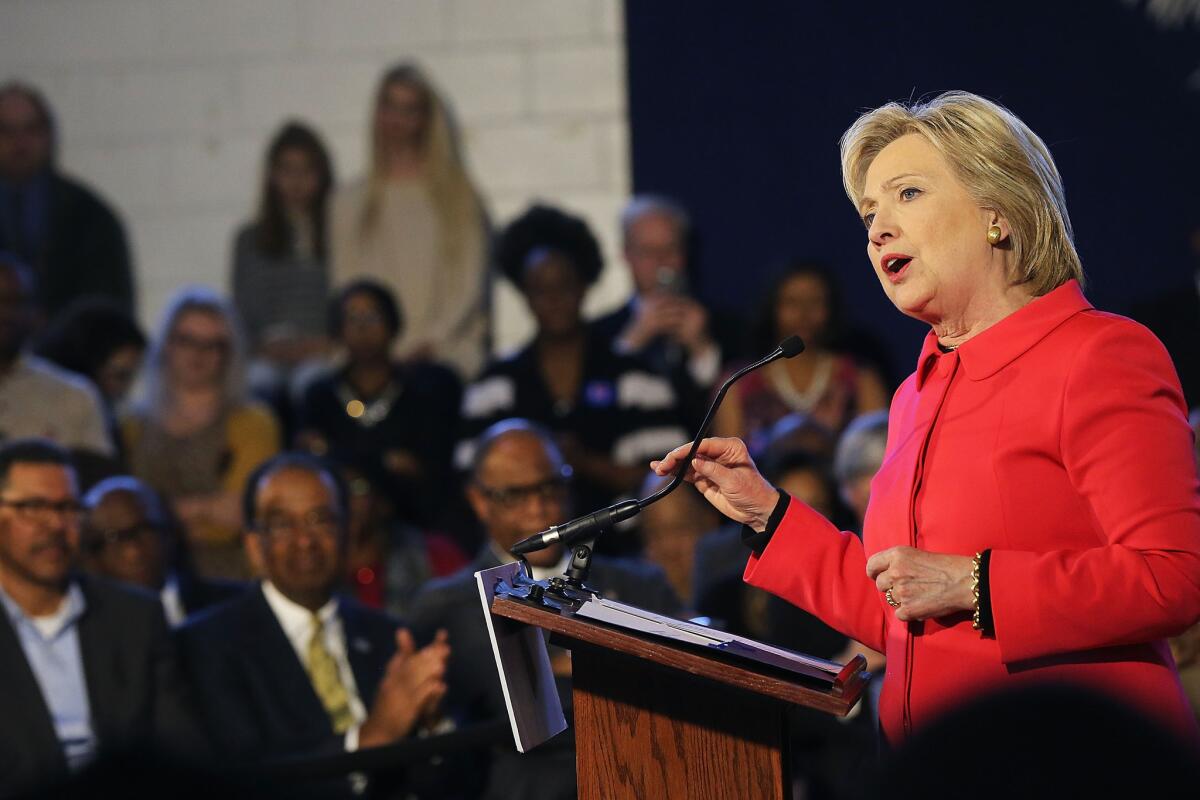Analysis: Hillary Clinton’s two-part strategy for derailing Bernie Sanders’ campaign

Democratic presidential candidate Hillary Clinton speaks to voters at a town hall meeting in Denmark, S.C., a day after her debate with rival candidate Sen. Bernie Sanders. Clinton is counting on strong support from African American voters in South Carolina.
Without a convincing victory in the first two presidential contests, Hillary Clinton has moved to a two-part strategy to try to knock off-stride the galloping candidacy of Bernie Sanders.
To African American, Latino and intensely loyal Democratic voters, she is casting President Obama as her running mate. She talked about Obama and their shared views 21 times during Thursday night’s two-hour presidential debate in Milwaukee. That was aimed at voters in Nevada and South Carolina, the next two states to vote, and racially diverse states further down the calendar.
At the same time, she is laying the groundwork to attract another key group of voters who will be crucial in later spring contests—white and more moderate Democrats. She hopes to convince them that Sanders’ proposals, if well-intended, would be impossible to achieve and potentially very costly. In her view, neither the Republican Congress nor American voters would accept the massive expansion of government that Sanders’ proposals would require.
TRAIL GUIDE: All the latest news on the 2016 presidential campaign >>
Taken together, the dual appeals mark an attempted end run around the enthusiasm that Sanders’ campaign has generated and that Clinton, with her more pragmatic and incremental approach, has had a difficult time matching.
Clinton’s vehement defense of Obama reflects a reality in today’s polarized political environment: Despite his middling numbers overall, Obama remains very popular among Democrats, particularly minority Democrats. A Pew Research poll released last month showed Obama with a 46% approval rating among all Americans—but an 80% approval among Democrats.
“Today, Sen. Sanders said that President Obama failed the presidential leadership test,” Clinton said Thursday night. “And this is not the first time that he has criticized President Obama. In the past he has called him weak. He has called him a disappointment. He wrote a forward for a book that basically argued voters should have buyers’ remorse when it comes to President Obama’s leadership and legacy.
“I don’t think he gets the credit he deserves for being a president,” she said, to a sustained roar from the audience.
Sanders grew angry. “Madam Secretary, that is a low blow,” he said, adding that he had supported Obama, if not at all times. “Last I heard we lived in a democratic society,” he said. “Last I heard, a United States senator had the right to disagree with the president, including a president who has done such an extraordinary job.”
Obama loyalists have piled on. After Sanders’ rejoinder, David Plouffe, who ran Obama’s 2008 campaign, sent out a tweet that included a picture of the book Clinton referred to. His caption — “Low Blow” — indicated he thought Sanders was the perpetrator, not the victim.
In South Carolina and other Southern states where African Americans make up a big share of the Democratic vote, Priorities USA, the big super PAC backing Clinton, has launched a $4.5 million campaign to bolster turnout of blacks, Latinos and women – groups that Clinton is strongest among. The ads will not attack Sanders, the group’s officials said, but will tout Clinton’s close ties to Obama.
Clinton made a quick trip to South Carolina on Friday for a town hall meeting before a largely African American audience in which she repeated her criticism of Sanders for being unsupportive of Obama and said his advocacy of banning big-dollar contributions from politics would not be a panacea for the problems facing low-income communities around the country.
“Here’s what I want you to know. I am not a single-issue candidate and this is not a single-issue country,” she said. Even if Sanders could get his way on campaign spending, “I worry that we’d still have lead in the water in Flint,” Mich., and “deteriorating schools here in South Carolina,” she said.
Sanders also was reaching out to minority voters by appearing at a conference in Minneapolis on race and economic opportunity.
The second strategy Clinton is employing is a a none-too-subtle suggestion that Sanders has not backed up his proposals with either funding or explanations of how he would push them through a Republican House and Senate. She agrees with many of his goals, she says, just not the way he seeks to achieve them.
Sanders has insisted that taxes on wealthy Americans and corporations overseas would pay for much of what he has proposed; the rest, he indicates, is an investment that Americans would be happy to finance if it meant better healthcare, roads and jobs. But many of his plans—like his proposal for a single-payer, Medicare-style healthcare plan for all Americans, would be government-run, a fact Clinton seized on Thursday night.
“The best analysis that I’ve seen based on Sen. Sanders’ plans is that it would probably increase the size of the federal government by about 40%,” Clinton said.
The sideways approach is meant to diminish the antagonism Clinton would generate from Sanders’ voters if she employed a frontal assault; she does, after all, need them not just to lose faith in him but to come to her side and to stay with her in the fall if she becomes the nominee. Sanders’ upside, she is saying, is really his downside, and a narrow focus on campaign finance reform, a single-payer healthcare program and bashing Wall Street is not enough.
“I have been very specific about where I would raise the money, how much it would cost, and how I would move this agenda forward,” Clinton said. “I’ve tried to be as specific to answer questions so that my proposals can be vetted, because I feel like we have to level with people… We have a special obligation to make clear what we stand for, which is why I think we should not make promises we can’t keep.”
Surrogates for Clinton are pressing that message as well. Virginia Sen. Tim Kaine said Friday that Sanders was a “risky bet” on foreign policy because his campaign was based on a small list of domestic concerns.
The challenge of Clinton’s two approaches is that they inevitably collide.
White Democrats who are low income or less educated have been the source of support for Clinton in past campaigns, although Sanders was extremely successful in attracting them in New Hampshire. Some of them historically have objected to what they see as Democrats bending over backward to help out African Americans or immigrants, including Latinos. And they are not fond of government, which they see as taking money and offering little in return.
Indeed, Clinton’s husband, Bill, faced the same dilemma when he ran for president in 1992. He helped keep that era’s moderate Democrats from abandoning his campaign with some high-profile centrist moves, like advocating reform of the welfare system.
With a firm hold on those voters, at least in the early states, Sanders will inevitably face the mirror image of Clinton’s challenge: how to hold on to economically stressed white voters while expanding his grasp on African Americans and Latinos. His entree is the young. Young white voters have flocked to his campaign in heavily white early states and he is trying to convince young minority voters to join his self-styled revolution.
The demands ahead for both candidates suggest that the solutions will not be found quickly, and that a long and arduous campaign season awaits.
For more on politics, follow @CathleenDecker
ALSO
Clinton mentioned President Obama’s name 21 times in her debate with Sanders
Nevada will be a crucial test for both the Clinton and Sanders campaigns
President Obama: “It’s not like I’ve changed since I entered politics”
More to Read
Get the L.A. Times Politics newsletter
Deeply reported insights into legislation, politics and policy from Sacramento, Washington and beyond. In your inbox three times per week.
You may occasionally receive promotional content from the Los Angeles Times.







